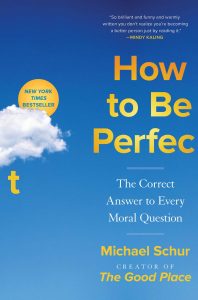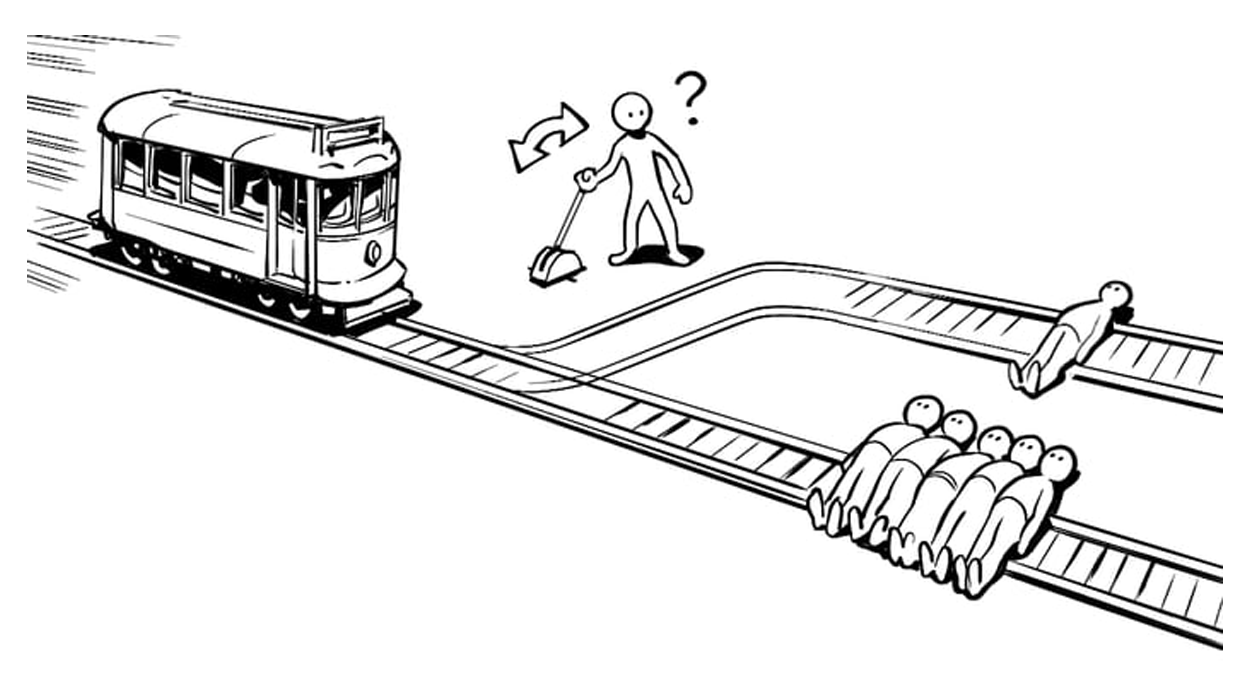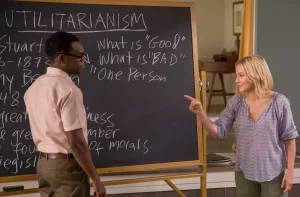
I just finished reading the 2022 book, How to Be Perfect: The Correct Answer to Every Moral Question by Michael Schur. Schur is a television writer and producer who has worked on shows including The Office and Master of None and created or co-created Parks and Recreation, Brooklyn Nine-Nine, and The Good Place.
Schur wrote How to Be Perfect in order to sort and summarize his lessons learned while creating the hit television series The Good Place. I highly recommend both the book and the television show for everyone who wants to become a better person.
Moral Questions from How to Be Perfect
The chapter titles in Schur’s book highlight some of the questions he covers in the book. You can immediately grasp his sense of humor, but may also be curious what the morally correct answers are.
- Should I Punch My Friend in the Face for No Reason?
- Should I Let This Runaway Trolley I’m Driving Kill Five People, or Should I Pull the Lever and Deliberately Kill One (Different) Person?
- Do I Have to Return My Shopping Cart to the Shopping Cart Rack Thingy?
- Should I Lie and Tell My Friend I Like Her Ugly Shirt?
- Should I Run into a Burning Building and Try to Save Everyone Trapped Inside?
- This Sandwich is Morally Problematic. But It’s Also Delicious. Can I Still Eat It?
- I Screwed Up. Do I Have to Say I’m Sorry?

Note that the questions get harder the deeper you get into the book.
Moral Philosophies Discussed in How to Be Perfect
Schur introduces readers to several moral philosophies as he answers some of his moral questions. He writes in a way that you or I can understand, acknowledging that many philosophical works are hard or boring to read. Here are some of the philosophies you will learn about:

- Aristotle’s virtue ethics: the purpose of life is to flourish, and we do this by attaining virtues. Virtues (like dutifulness) must be attained at the right level (a golden mean) and not overdone.
- Utilitarianism was developed by Jeremy Bentham and John Stuart Mill. Utilitarianism is a branch of ethical philosophy called consequentialism that focuses on the consequences of actions, and not the intent.
- Immanuel Kant’s theory of deontology, or the study of duties or obligations. This is a rigid, logical system: following the right rules = acting morally.
- T.M. Scanlon’s “contractualism” ethics. This adds societal rules and “reasonableness” to deontological theory.
- William James’s pragmatism – “a mediator and reconciler” to arrive at a truth considering multiple moral philosophies.
If you are a philosopher, you will likely be annoyed at Schur’s writing style and analysis. Schur is writing this for the 99+% of people who have never, and will likely never, read these texts.
Additional Philosophers and Theories in How to Be Perfect
Schur adds context to the primary moral philosophies above by sharing additional concepts:

- The practical imperative: don’t use people to get what you want.
- Ubuntu is a Zulu (Western African) concept similar to contractualism. It is focused on what is good for society more so than what is good for the individual.
- Moral exhaustion – a new term Michael Schur wants to popularize. This is how he feels when trying to make the correct moral decisions.
- Joseph Overton’s concept of societal norms shifting over time. Overton windows represent the “range of acceptance” for a view. It is common for these ranges, or Overton windows, to shift as society normalizes a topic.
- Ayn Rand’s theory of “objectivism” or rational selfishness. Schur does not find much help from Rand in his quest for the right answers to his moral questions.
- Peter Singer’s views on utilitarianism. The opposite of Rand, but still extreme.
- Jean-Paul Sarte and Albert Camus’s existentialist teachings. Existentialism has some similarities to Rule 10 of the Personal Kaizen 10 Rules for Life. Find some meaning in the universe, make decisions through actions, and live with them.
- John Rawls idea (similar to Scanlon’s contractualism) that a fair way to structure society would be to set the societal rules in place before you know how you will be part of the society.
- Harry Frankfurt’s aim to distinguish bullshit from lying. Lying is in opposition to the truth. Bullshit ignores the truth and focuses on the impression being conveyed.
How Should We Make Moral Decisions?
First, this is a book I invite you all to read rather than stopping at my summary. Schur ends the book with a letter to his children in which he shares the following:
“Thousands of years ago, in a part of Greece called Delphi, some people built a temple. They were worried about their kids too … so they chiseled a couple of sayings into a column of that temple to tell their kids, and their grandkids, and their great-grandkids, in as few words as possible, how to try to pull off the nearly impossible task of living a good life on earth. Here’s what they wrote:”
“Know thyself”
and
“Nothing in Excess”
I find it tough to argue with this quick-start guide to life.
Lean East is a business process improvement firm based in the state of Maine. We also support Personal Kaizen – individual continuous improvement – and believe that small, daily changes will lead to a successful and happy life.


Related Posts
How to Use Kotter’s 8-Step Process for Leading Change
The God Complex: Why We’re All Making This One Mistake
How I am Changing the Career Advice I Give My Kids